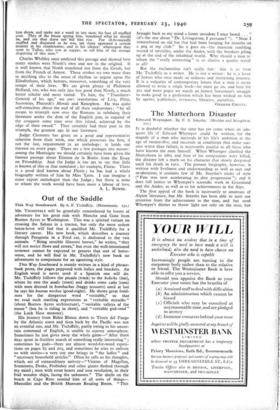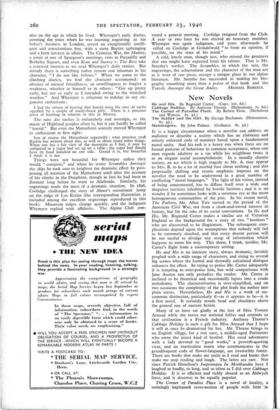The Matterhorn Disaster
Edward Whymper. By F. S. Smythe. (Hodder and Stoughton
21S.)
IT is doubtful whether the time has yet come when an ade- quate life of Edward Whymper could be written, for the tragedy of a man who succeeds in his life's ambition at the age of twenty-five, and succeeds in conditions that make suc- cess worse than failure, is necessarily painful to all those who have known the man himself. When Whymper climbed the Matterhorn in 1865 and four of his companions were killed, the disaster left a mark on his character that slowly deepened until his death in i9ir. The present biography, however, is written with liveliness and understanding as well as tact and moderation; it contains few of Mr. Smythe's tricks of style (" Fate was now accelerating its dire progression "), and it does full justice to Whymper's scientific work in Greenland and the Andes, as well as to his achievements in the Alps.
The first appeal of the book is necessarily to amateurs of Alpine literature, but Mr. Smythe has been able to turn our attention from the achievement to the man, and has used Whymper's diaries to throw light not only on the man, but
also on the age in which he lived. Whymper's early diaries, covering the years when he was learning engraving in his
father's business in London, reveal an exceptionally intelli- gent and conscientious boy, with a stern Baptist upbringing and a keen interest in affairs. The Crimean War, the Mutiny,
a panic at one of Spurgeon's meetings, riots in Piccadilly and Berkeley Square, and even Kent and Surrey v. The Rest take
a renewed interest as we read Whymper's daily entries. But already there is something rather remote and inhuman in his character, " I do not like fellows." When we come to the climbing diaries, we find the character accentuated : an absence of natural friendliness, an unwillingness to forgive a weakness, whether in himself or in others : " Got up pretty early, but not so early as I intended owing to the wretched weather." And Whymper is reluctant to indulge in any ex- pansive enthusiasm:
I had the misery of hearing that horrid noise the ranz de vache squalled by a couple of mealy-faced girls. There is a precious piece of humbug in relation to this in Murray.
The ranz des vaches is melancholy and nostalgic, as the music of Highland peoples often is, but it can hardly be called " horrid." But even the Matterhorn scarcely moved Whymper to enthusiasm at first sight : Saw of course the Matterhorn repeatedly ; what precious stuff Ruskin has written about this, as well as about many other things. When one has a fair view of the mountain as I had, it may be compared to a sugar loaf set up on a table ; the sugar loaf should have its head knocked on one side. Grand it is, but beautiful I think it is not.
Things were not beautiful for Whymper unless they would " compose," and when he wrote Scrambles Amongst the Alps he took care to heighten the dramatic effect by post-
poning all mention of the Matterhorn until after the account of his climbs in the Dauphine, though in fact he had been to Zermatt long before he went to Ailefroide. Similarly, his engravings made the most of a dramatic situation. In 1898, Coolidge challenged the story of Almer's sensational jump on the ridge of Les Ecrins (the corresponding illustration is included among the excellent engravings reproduced in this book). Mountain ridges change quickly, and the indignant
Whymper replied with affidavits. The Alpine Club con-
vened a general meeting. Coolidge resigned from the Club. A year or two later he was elected an honorary member. Whymper was again indignant, and years afterwards he called on Coolidge at Grindelwald " to form an opinion, if possible, on the state of his mind."
A cold, lonely man, though just, who missed the greatness that one might have expected from his talents. That is Mr. Smythe's verdict. The Scrambles, in which the text, the engravings, the achievement and the character of the man are as it were of one piece, occupy a unique place in our alpine literature. Mr. Smythe has succeeded in making his bio- graphy something more than a précis of that book and the Travels Amongst the Great Andes. MICHAEL. ROBERTS.







































 Previous page
Previous page